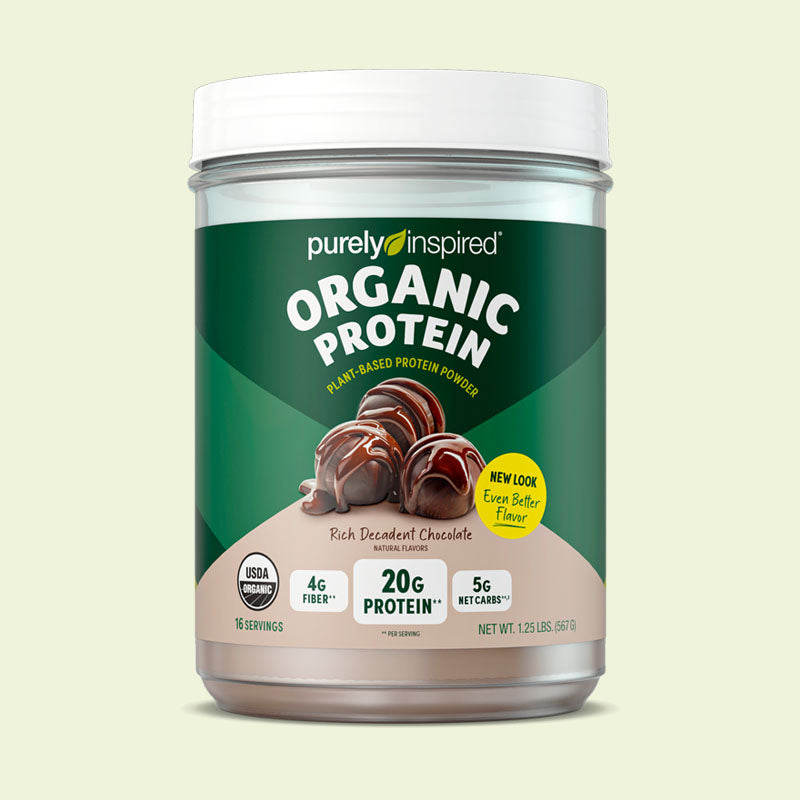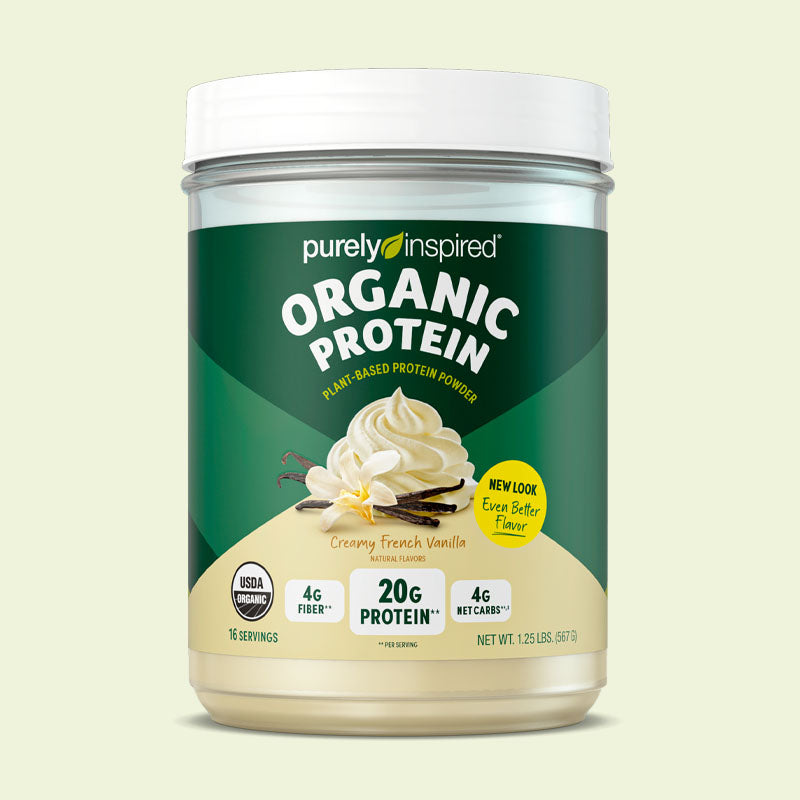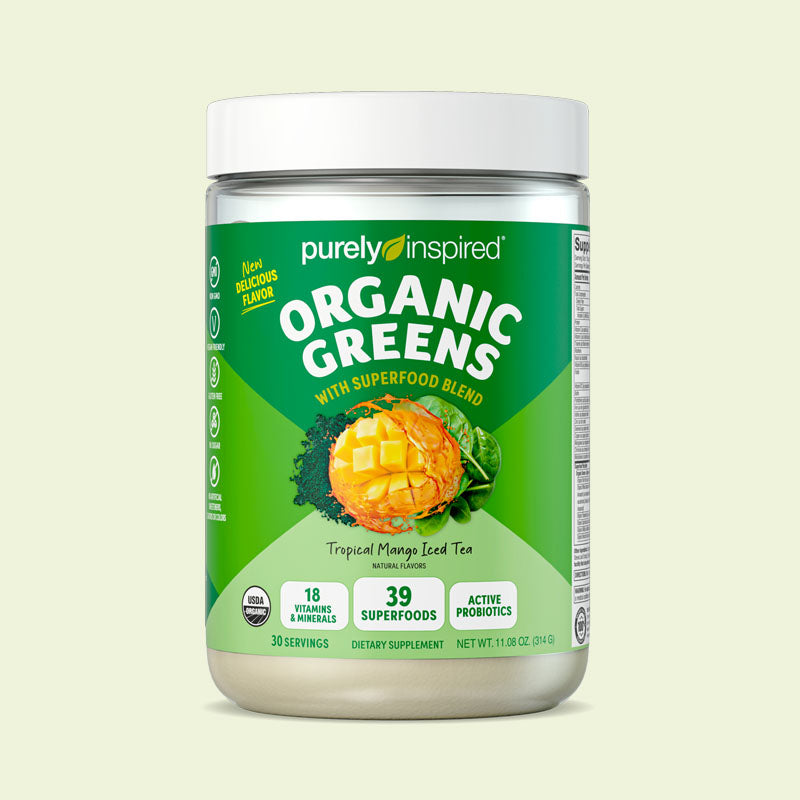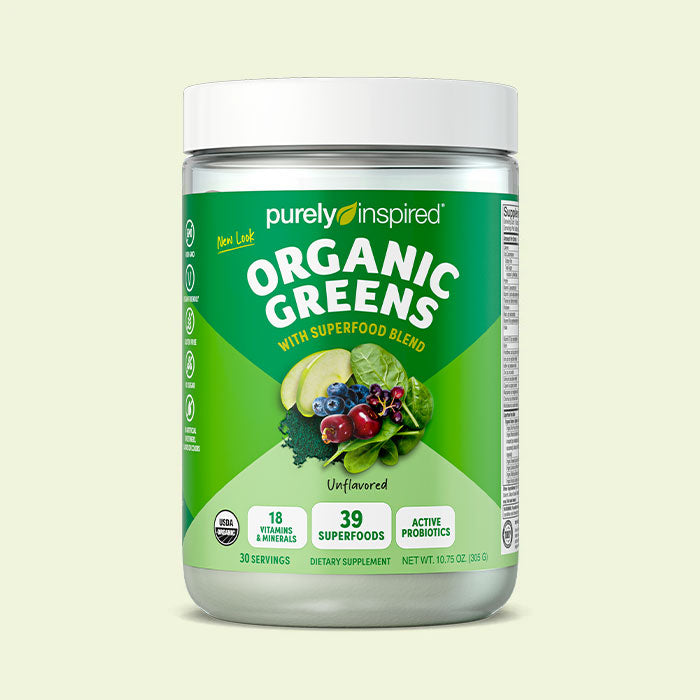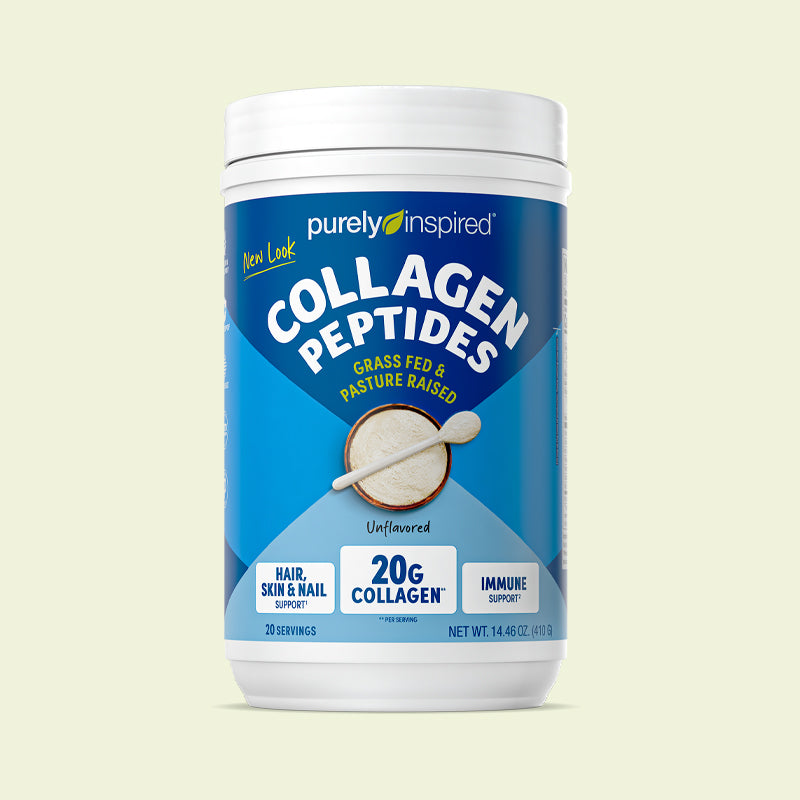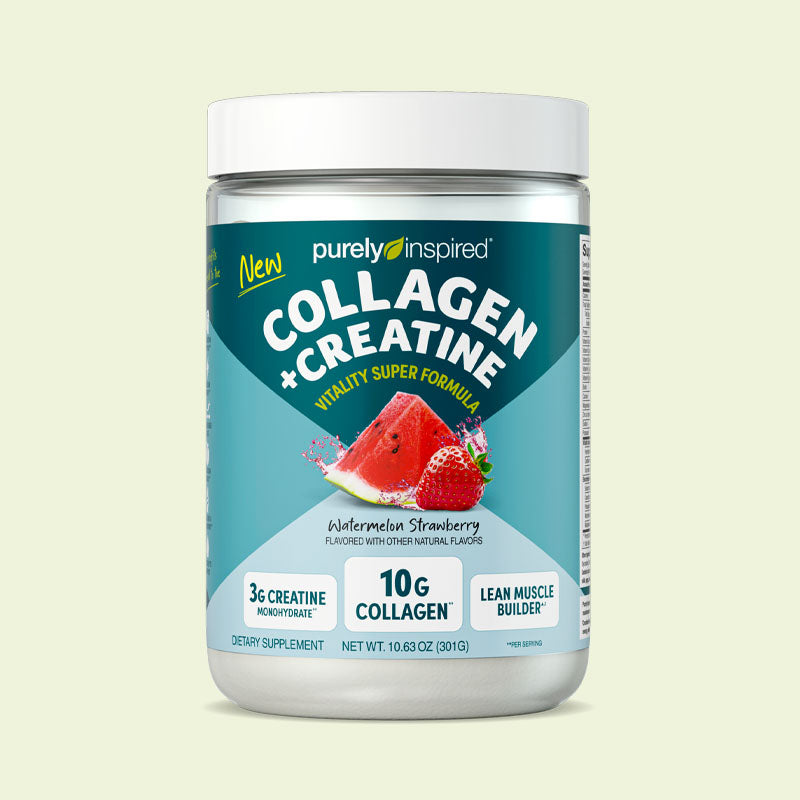Are you questioning whether or not it is a good idea to supplement with collagen and whey protein simultaneously or keep them separate? Maybe you are wondering how compatible they are together.
Trying to decide if it is a good idea to combine certain nutrients can be puzzling. Especially when you are aware of how nutrients are absorbed in the body.
In this blog, we are going to dive into this exact question: "Can you take collagen and whey protein together?" and show you why there is no need to worry about combining collagen and whey protein!

Shop & Save on Organic Supplements
We'll uncover how feasible it is to combine these two supplements, whether or not they will hurt absorption, and the potential pros of using them separately. We'll guide you on the best strategy and our unique experience.
By the end of this article, you will be empowered to optimize your protein supplementation for your fitness goal, whether it be growing muscle mass, enhancing recovery, or improving your overall well-being.
But before we start, remember that this post is for informational purposes only and may not be the best fit for you and your situation. It shall not be construed as medical advice.
The information and education provided here are not intended or implied to supplement or replace professional medical treatment, advice, and/or diagnosis.
Always check with your physician or medical professional before trying or implementing any information you read here.
Can you take Collagen and Whey Protein Powder Together?
According to our research, combining collagen and whey protein is possible. (1) Both of these proteins serve distinct primary roles within the body. Collagen is the primary constituent for the body's connective tissues, including ligaments, tendons, and skin. (2)
Whey protein is mainly responsible for muscle building and tissue repair. (3) Research indicates that consuming both proteins does not affect absorption or effectiveness. (1)
Doing so allows you to harness the benefits of each without complicating your supplement strategies by taking them at different times.
Also Read: Your Fitness Journey with Essential Amino Acids
Impact on Absorption
The first step to determine whether or not to supplement collagen and whey protein together is to understand the impact that it may have on their absorption within the body.
The amino acid profiles (building blocks of protein) of collagen supplements and whey protein supplements have distinct differences.
Shop & Save on Collagen Peptides
When considering the amino acid profiles of whey and collagen protein in relation to muscle and connective tissue, a nuanced understanding emerges. Whey protein, rich in essential amino acids and particularly abundant in branched-chain amino acids (BCAAs) such as leucine, holds a key role in supporting muscle protein synthesis. This amino acid composition is important for individuals aiming to build or maintain muscle mass, making whey an ideal choice for those focused on physical performance.
Also Read: BCAA vs. EAA - All You Need to Know
On the other hand, collagen protein, with its emphasis on glycine, proline, and hydroxyproline, aligns closely with the amino acid profile of our connective tissues. These specific amino acids are involved in the formation and maintenance of collagen, the primary structural protein in connective tissues.
Fortunately, if you want to simplify your supplement regime and have one powerful post-workout shake or meal replacement, collagen peptides, and whey protein can be combined without an absorption issue.

Shop & Save on Organic Protein
Optimal Dosing Strategies
Deciding on the best dosing strategy for collagen and whey protein supplements requires a unique approach that aligns with your needs and fitness goals.
For instance, if you lack adequate collagen intake in your diet through food sources like bone broth and other animal products, you may want to increase your collagen intake.
Similarly, increasing your whey protein is a good idea if you do frequent high-intensity resistance training.
Also Read: What is the Best Way to Take Collagen?
So how much collagen and whey protein should you take?
Research suggests that taking 20g of whey protein after exercise maximizes muscle protein synthesis at rest and after resistance exercise. (See- https://pubmed.ncbi.nlm.nih.gov/24257722/)
Research findings for collagen supplement are mixed. For example, a recent study determined that while 30g of collagen and 30g of whey protein are digested over 5 hours, collagen nor whey protein affect short term rates on post-exercise collagen protein synthesis ( See: https://pubmed.ncbi.nlm.nih.gov/37202878/).
However, other research studies demonstrated that 15-20g of collagen can improve collagen synthesis and some markers of performance (See: https://pubmed.ncbi.nlm.nih.gov/34808597/ & https://pubmed.ncbi.nlm.nih.gov/34808597/).
Therefore, a collagen supplements that provide 15-20g of collagen and a whey protein powder that offers at around 20g of protein per serving may be beneficial.. (2,4)
Also Read: How Much Collagen Should You Take a Day?You can even consider a more personalized nutrition approach by considering your body weight. For example, is there a one size fits all for a 20g protein dose? Research suggests that 0.3g/kg of high quality, rapidly digested protein, such as whey, maximizes muscle protein synthesis ( ) . Therefore, if you weigh around 50kg, 15g of protein is sufficient for you, whereas if you weigh 100kg, 30 g is sufficient for you.
This study showed that 10-20g of collagen over 6-9 months improved physical outcomes in active men and women. (5)
However, finding the right balance for you regarding total protein intake via supplementation is based on what you need individually. It most often involves finding and consulting with a qualified healthcare professional or nutritionist.
They can help you determine the most suitable dosage and ensure protein intake meets your dietary needs.
Benefits of Supplementing Separately
Having specific fitness goals is the only significant advantage of taking these proteins individually.
If you consume enough animal products that provide you with enough collagen within the diet and want to increase your muscle mass, opting for a whey protein-only shake post-workout is fine.
However, it is essential to note that the reduced effectiveness of each protein by combining collagen and whey protein has yet to be investigated by current research.
Collagens Role in The Body
Collagen is the primary protein for structure in the human body and is the most abundant protein in the human body. (6)
Research shows that a lesser-known fact about collagen is that it can enhance fitness results when combined with a strength training program. (2)
The versatility of collagen highlights how combining the two supplements into one post-workout shake may be beneficial—capitalizing on collagen's properties with whey protein's muscle recovery and muscle protein synthesis initiating effects.
Whey Protein’s Role in the Body
Whey protein is the clear choice for fitness enthusiasts when optimizing their fitness routine, lean muscle mass growth, repair, and overall muscle strength. (1) Whey protein is sourced from the liquid portion of milk during cheese production. (1)
Whey protein is so powerful as an exercise recovery supplement because its amino acid profile is a complete protein source containing all nine essential amino acids. (3)
These essential amino acids are "essential" because the body cannot produce them and must be consumed in the diet. (3)
Also Read:Can Men Take Collagen & Why?
The BCAAs, specifically leucine, found in whey protein act as a key to starting muscle protein synthesis, which is the process of muscle growth and repair after a tough training session. (3) The amino acid leucine, in particular, has a powerful effect on starting the muscle protein synthesis process. (3)
These benefits and their effect on muscle repair and post-workout recovery make whey protein the best option for fitness enthusiasts.
Our Take on Combining Collagen and Whey Protein
Beyond the differences that we discussed, both proteins play important roles in the body. Whey protein is recognized for muscle building, while collagen protein is associated with connection tissue.
Interestingly, there's no inherent conflict in co-ingesting whey and collagen protein; in fact, their combination can offer a more comprehensive amino acid profile. Individuals aiming for athletic performance and muscle development may find whey protein beneficial, while others may lean towards collagen protein.
Read Now:Collagen Protein vs Whey Protein: Which is Better & Why?
Ultimately, the decision depends on your goals, and it's advisable to consult with healthcare or nutrition professionals before making significant dietary changes. In summary, incorporating whey and collagen protein, either individually or together, provides a personalized strategy for supporting diverse aspects during your fitness journey.
Most importantly, staying consistent with a supplement and exercise routine is critical if you hope to see these benefits, and simplifying the approach that is specific to your goals is the best way to increase consistency.
Like choosing the best collagen powder, stick to the highest quality products that fit your unique dietary needs and provide you with the dosing requirements supported by research.
Shop & Save on Organic Supplements
Read More Blogs:
- What to Mix with Protein Powder?
- BCAAs for Women: Your Fitness Journey with Essential Amino Acids
- Does Whey Protein Have Lactose?
- Can Men Take Collagen & Why?
- When to Take Collagen While Fasting?
The links used in this article are being provided as a convenience and for informational purposes only; they do not constitute an endorsement or an approval by Iovate Health Sciences International Inc. or any of its affiliates (“Iovate”) of any of the products, services or opinions of the corporation or organization or individual. Iovate bears no responsibility for the accuracy, legality or content of the external site or for that of subsequent links. Contact the external site for answers to questions regarding its content.
References:
- Brook, M. S., Scaife, P., Bass, J. J., Cegielski, J., Watanabe, S., Wilkinson, D. J., Smith, K., Phillips, B. E., & Atherton, P. J. (2021). A collagen hydrolysate/milk protein-blend stimulates muscle anabolism equivalently to an isoenergetic milk protein-blend containing a greater quantity of essential amino acids in older men. Clinical nutrition (Edinburgh, Scotland), 40(6), 4456–4464. https://doi.org/10.1016/j.clnu.2021.01.002
- Oertzen-Hagemann, V., Kirmse, M., Eggers, B., Pfeiffer, K., Marcus, K., de Marées, M., & Platen, P. (2019). Effects of 12 Weeks of Hypertrophy Resistance Exercise Training Combined with Collagen Peptide Supplementation on the Skeletal Muscle Proteome in Recreationally Active Men. Nutrients, 11(5), 1072. https://doi.org/10.3390/nu11051072
- Hulmi, J. J., Lockwood, C. M., & Stout, J. R. (2010). Effect of protein/essential amino acids and resistance training on skeletal muscle hypertrophy: A case for whey protein. Nutrition & metabolism, 7, 51. https://doi.org/10.1186/1743-7075-7-51
- Stefanovic B. (2013). RNA protein interactions governing expression of the most abundant protein in human body, type I collagen. Wiley interdisciplinary reviews. RNA, 4(5), 535–545. https://doi.org/10.1002/wrna.1177
- Kviatkovsky, S. A., Hickner, R. C., Cabre, H. E., Small, S. D., & Ormsbee, M. J. (2023). Collagen peptides supplementation improves function, pain, and physical and mental outcomes in active adults. Journal of the International Society of Sports Nutrition, 20(1), 2243252. https://doi.org/10.1080/15502783.2023.2243252
- https://wires.onlinelibrary.wiley.com/doi/10.1002/wrna.1177





